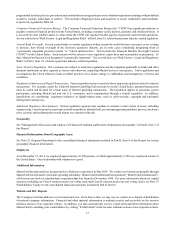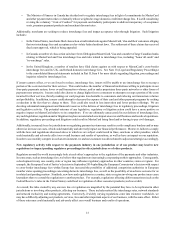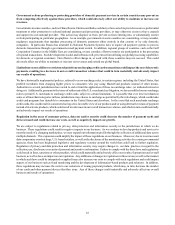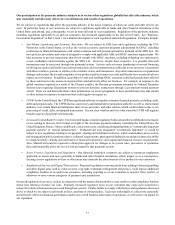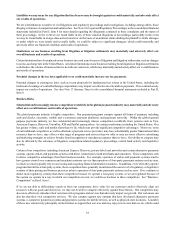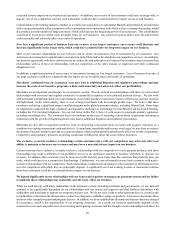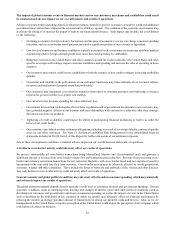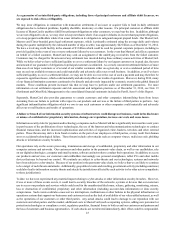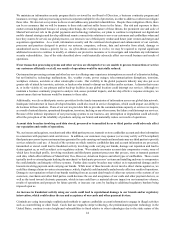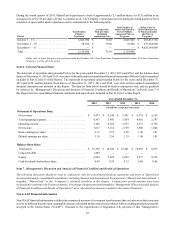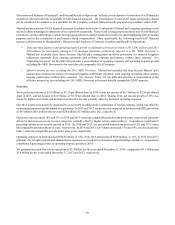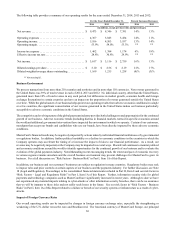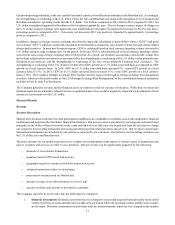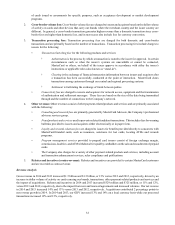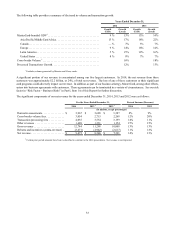MasterCard 2014 Annual Report Download - page 25
Download and view the complete annual report
Please find page 25 of the 2014 MasterCard annual report below. You can navigate through the pages in the report by either clicking on the pages listed below, or by using the keyword search tool below to find specific information within the annual report.23
As a guarantor of certain third-party obligations, including those of principal customers and affiliate debit licensees, we
are exposed to risk of loss or illiquidity.
We may incur obligations in connection with transaction settlements if an issuer or acquirer fails to fund its daily settlement
obligations due to technical problems, liquidity shortfalls, insolvency or other reasons. If a principal customer or affiliate debit
licensee of MasterCard is unable to fulfill its settlement obligations to other customers, we may bear the loss. In addition, although
we are not obligated to do so, we may elect to keep merchants whole if an acquirer defaults on its merchant payment obligations,
or to keep prepaid cardholders whole if an issuer defaults on its obligation to safeguard unspent prepaid funds. Our MasterCard,
Maestro and Cirrus-branded gross legal settlement exposure, which is primarily estimated using the average daily card volume
during the quarter multiplied by the estimated number of days to settle, was approximately $42 billion as of December 31, 2014.
We have a revolving credit facility in the amount of $3 billion which could be used for general corporate purposes, including to
provide liquidity in the event of one or more settlement failures by our customers. In the event that MasterCard effects a payment
on behalf of a failed customer, MasterCard may seek an assignment of the underlying receivables from the failed customer.
Customers may be charged for the amount of any settlement loss incurred during these ordinary course activities of MasterCard.
While we believe that we have sufficient liquidity to cover a settlement failure by our largest customer on its peak day, the term
and amount of our guarantee of obligations to principal customers is unlimited. As a result, concurrent settlement failures of more
than one of our larger customers or of several of our smaller customers either on a given day or over a condensed period of time
may exceed our available resources and could materially and adversely affect our overall business. In addition, even if we have
sufficient liquidity to cover a settlement failure, we may not be able to recover the cost of such a payment and may therefore be
exposed to significant losses, which could materially and adversely affect our results of operations. Moreover, during 2014, many
of our financial institution customers continued to be directly and adversely impacted by economic events in the global financial
markets. These conditions present increased risk that we may have to perform under our settlement guarantees. For more
information on our settlement exposure and risk assessment and mitigation practices as of December 31, 2014, see Note 19
(Settlement and Other Risk Management) to the consolidated financial statements included in Part II, Item 8 of this Report.
Separately, MasterCard also provides guarantees to certain customers and other companies indemnifying them from losses
stemming from our failure to perform with respect to our products and services or the failure of third parties to perform. Any
significant indemnification obligation which we owe to any such customers or other companies could materially and adversely
affect our overall business and results of operations.
A failure or breach of our information security systems or infrastructure could disrupt our business, result in the disclosure
or misuse of confidential or proprietary information, damage our reputation, increase our costs and cause losses.
Information security risks for payments and technology companies such as MasterCard have significantly increased in recent years
in part because of the proliferation of new technologies, the use of the Internet and telecommunications technologies to conduct
financial transactions, and the increased sophistication and activities of organized crime, hackers, terrorists and other external
parties. These threats may derive from fraud or malice on the part of our employees or third parties, or may result from human
error or accidental technological failure. These threats include cyber-attacks such as computer viruses, malicious code, phishing
attacks or information security breaches.
Our operations rely on the secure processing, transmission and storage of confidential, proprietary and other information in our
computer systems and networks. Our customers and other parties in the payments value chain, as well as our cardholders, rely
on our digital technologies, computer and email systems, software and networks to conduct their operations. In addition, to access
our products and services, our customers and cardholders increasingly use personal smartphones, tablet PCs and other mobile
devices that may be beyond our control. We routinely are subject to cyber-threats and our technologies, systems and networks
have been subject to cyber-attacks. Because of our position in the payments value chain, we believe that we are likely to continue
to be a target of such threats and attacks. Additionally, geopolitical events and resulting government activity (including sanctions)
could also lead to information security threats and attacks by jurisdictions affected by such activity (or by other actors sympathetic
to those jurisdictions).
To date, we have not experienced any material impact relating to cyber-attacks or other information security breaches. However,
if one or more of these events occurs, it could lead to security breaches of the networks, systems or devices that our customers
use to access our products and services which could result in the unauthorized disclosure, release, gathering, monitoring, misuse,
loss or destruction of confidential, proprietary and other information (including account data information) or data security
compromises. Such events could also cause service interruptions, malfunctions or other failures in the physical infrastructure or
operations systems that support our businesses and customers (such as the lack of availability of our value-added systems), as well
as the operations of our customers or other third parties. Any actual attacks could lead to damage to our reputation with our
customers and other parties and the market, additional costs to MasterCard (such as repairing systems, adding new personnel or
protection technologies or compliance costs), regulatory penalties, financial losses to both us and our customers and partners and
the loss of customers and business opportunities. If such attacks are not detected immediately, their effect could be compounded.


